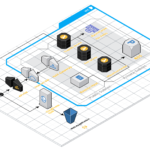As we venture further into the 21st century, the pace of technological advancement shows no signs of slowing. Each year, groundbreaking innovations emerge, promising to reshape our daily lives, enhance the way we communicate, and redefine the global landscape. In this article, we explore several key innovations on the horizon that could significantly transform our lives in the foreseeable future.
1. Artificial Intelligence and Machine Learning
Artificial Intelligence (AI) and machine learning are set to revolutionize various sectors, from healthcare to education, and beyond. AI-driven algorithms are already making waves with personalized medicine, where treatment plans are tailored based on individual genetic profiles. In education, AI can provide customized learning experiences for students, adapting resources based on their progress and learning styles. Furthermore, AI in everyday applications can improve decision-making, optimize logistics, and enhance customer service through chatbots and virtual assistants, ultimately making our lives more efficient.
2. Sustainable Energy Solutions
The urgent need for sustainable energy sources is becoming increasingly critical in the face of climate change. Innovations in solar technology, wind energy, and energy storage solutions, such as advanced batteries, are paving the way for a greener future. Breakthroughs in solar panel efficiency and wind turbine design will allow for cheaper and more effective sources of renewable energy. Additionally, smart grids and energy management systems will enable consumers to harness and manage energy from various sources, leading to reduced carbon footprints and increased energy independence.
3. Biotechnology and Personalized Medicine
The realm of biotechnology is one of the most promising areas for innovation. Gene editing technologies, primarily CRISPR-Cas9, are making it possible to alter the genetic makeup of organisms, including humans. This has profound implications for treating genetic disorders, developing resistant crops, and even combating diseases like cancer. As our understanding of the human genome deepens, personalized medicine is expected to become the norm, where treatments are customized to individual genetic profiles, improving effectiveness and minimizing side effects.
4. The Rise of Smart Cities
Urbanization continues to escalate, with more than half of the world’s population now living in cities. The concept of smart cities leverages technology to enhance the quality of life for residents. Innovations such as IoT (Internet of Things) devices can help manage everything from traffic flows to waste management, leading to more efficient urban environments. Smart energy systems can optimize power consumption, while advanced public transportation solutions can reduce congestion and emissions. The aim is to create sustainable and resilient urban areas that prioritize the well-being of their inhabitants.
5. The Future of Work and Remote Collaboration
The nature of work is evolving, driven in part by the COVID-19 pandemic and technological advancements. Remote collaboration tools are becoming increasingly sophisticated, with virtual reality (VR) and augmented reality (AR) enabling immersive work experiences. As organizations embrace hybrid work models, innovations in digital communication will facilitate teamwork and productivity, regardless of geographical boundaries. AI tools that automate routine tasks will allow workers to focus on more strategic initiatives, fostering creativity and collaboration in the workplace.
6. Advanced Robotics and Automation
Robotic automation is set to transform industries ranging from manufacturing to healthcare. Innovations in robotics are yielding machines that can perform complex tasks alongside humans, increasing efficiency and safety. In healthcare, robotic surgeries and telepresence robots are enhancing patient care and expanding access to medical expertise across geographic barriers. As the technology advances, we can also expect robots to take on more roles in our daily lives, from household chores to personal assistants.
7. Quantum Computing
Quantum computing holds the potential to solve complex problems beyond the capabilities of classical computers. With the ability to process vast amounts of data simultaneously, quantum machines could revolutionize fields ranging from cryptography to drug discovery. This transformative technology could lead to breakthroughs in materials science, precision medicine, and financial modeling, ultimately reshaping industries and enhancing problem-solving capabilities.
Conclusion
The innovations on the horizon promise to create a future that is not only technologically advanced but also sustainable and more attuned to human needs. While challenges associated with ethical considerations, equity, and potential job displacement remain, the path forward is filled with opportunities for transformative change. Embracing these innovations will require collective effort from individuals, businesses, and governments to ensure a future where technology enhances the quality of life for all. As we stand on the threshold of this exciting new era, the possibilities are limited only by our imagination and willingness to adapt.




